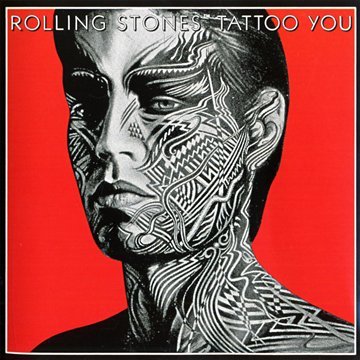
Tattoo You (1981)

1.Start Me Up
2.Hang Fire
3.Slave
4.Little T&A
5.Black Limousine
6.Neighbors
7.Worried About You
8.Tops
9.Heaven
10.No Use in Crying
11.Waiting on a Friend
By the time Tattoo You arrived in 1981, the Rolling Stones had long since outlived most of their peers, both in relevance and in stamina. At a stage when many of their contemporaries were taking extended breaks or fading quietly into nostalgia, the Stones carried on—reliably releasing a new album every year or so, despite the well-documented chaos of their personal lives. That they managed to continue at all was impressive. That they produced a record of this calibre was something close to miraculous.
Tattoo You is often cited—perhaps justifiably—as the band’s last truly essential studio album (although this author would disagree). It is also, somewhat paradoxically, a record built largely from fragments of older material—songs written, recorded, and then left on the shelf during earlier sessions. But rather than feel disjointed or dated, the album plays with a surprising sense of unity and polish. Had the band not disclosed the archival nature of the material, few listeners would have guessed it.
Stylistically, the record marks a pivot away from the disco and dance textures of the late 1970s and leans instead into a more soulful, laid-back groove. Tracks like Slave, Tops, Waiting on a Friend, and Worried About You showcase this shift beautifully. The performances are loose yet purposeful—never hurried, yet never overindulgent. Saxophonist Sonny Rollins makes notable guest appearances, lending these tracks an unexpected jazz inflection that works far better than it has any right to. That the saxophone had rarely featured so prominently in the band’s past makes its seamless integration here all the more remarkable.
Yet despite the album’s smooth undercurrent, the Stones had not lost their bite. Start Me Up—arguably the band’s final ubiquitous anthem—opens the record with immediate force. It would soon become an international staple, from stadiums to television commercials, and while its omnipresence has dulled its impact somewhat, its structure and drive remain impeccable. Elsewhere, Hang Fire and Neighbours deliver sharp, fast bursts of energy, the former featuring the band’s distinctive falsetto harmonies, while Little T&A offers Keith Richards at his most unfiltered. The lyrics may not survive close scrutiny (or modern broadcast standards), but the track barrels forward with undeniable charm and verve.
The record closes on a reflective note with Waiting on a Friend, a track that manages to be wistful without becoming sentimental. It is a fitting coda—not just for the album, but in some respects, for an era. The band, now well into their forties, were not trying to recapture youth so much as redefine it on their own terms.
Tattoo You is not just a high-water mark in the band’s later career—it is a testament to their ability to adapt, to revise, and most crucially, to endure. Whether it was assembled from new ideas or old tapes is ultimately beside the point. The result was an album that sounded not only vital, but inevitable.
Go back to the main page
Go To Next Review